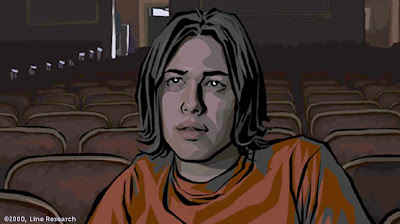October 21, 2001 [Mulholland Dr., Waking Life]
Marc Ribot's "Prosthetic Cubans" version of "La Vida es un Sueño" is running in my head as I think about Mulholland Dr. and Waking Life. A bolero of finality, of the sigh after a glimpse into the unlocked box, the whispered "Silencio" at the end of a dream--that doesn't end, of course.
But is that too easy, to mourn that life is a (meaningless) dream?--and I don't mean that the movies are easy; it's me, hoping to grasp the elusive but ineluctable with as brief a declaration as possible. But within Waking Life life's dreams are lives. The light switches are ineffective, the numbers on the clock blurred--but the fellow-dreamers are loquacious--OK, sometimes menacing, sometimes maybe crazy. Wiley Wiggins--and I can see the alternate-universe series of books written about such a character: Wiley Wiggins and the Murky Pond, Wiley Wiggins and the Almost-Empty Room, Wiley Wiggins and the Undelivered Parcel--some sort of Edward Gorey world-within-a-world, finely etched in ink, with dark corners and vague shapes in the distance.
Where was I? Oh, right:
Wiley Wiggins, who plays the unnamed dreamer, certainly drifts aimlessly--but that's fair: This is a Richard Linklater picture, given to rumination. The entirety of Waking Life is captured in miniature by the first segment of Slacker, in which Linklater himself plays the guy in the cab considering whether dreams are glimpses into the countless other lives you lead--all those unchosen choices creating the you who turned left instead of right, who didn't stay at the bus station but took the cab, and so on into infinity. So in Waking Life we see where the dreamer goes, his own choices spur-of-the-moment, the others he meets also dreaming, figuring out Everything one monologue at a time. Linklater computer-colors the movie, turning it into Yellow Submarine for talkers. I'm not sure it's a "movie," but I know I didn't want it to end.
Can I say the same for Mulholland Dr.? David Lynch continues to wonder what kind of dream life is, and finds that Hollywood really is the Dream Factory--but of course it's all a trap. He considers the possibility of glowing beauty: the creamy surfaces of the skin of his actresses lie in the frame like morsels of divinity. But then there's the man behind the dumpster, in a scene that made me want to give up dreaming altogether--and seeing, and staying in my seat. Lynch knows how every night we ask for good dreams--but how the dreams we get are the ones we've already lived--or are living somewhere, if Linklater is to be believed; and they are bent and worn with use.
Even if this is true, even if it's just "a recording," the orchestra, in all its prosthetic, posing falsehood, still fills our hearts with joy and sorrow and dread. Mulholland Dr. may be only a movie about movies, but it's one we step into, one that bears down on us with promises and clutches at us to speed our descent.
But is that too easy, to mourn that life is a (meaningless) dream?--and I don't mean that the movies are easy; it's me, hoping to grasp the elusive but ineluctable with as brief a declaration as possible. But within Waking Life life's dreams are lives. The light switches are ineffective, the numbers on the clock blurred--but the fellow-dreamers are loquacious--OK, sometimes menacing, sometimes maybe crazy. Wiley Wiggins--and I can see the alternate-universe series of books written about such a character: Wiley Wiggins and the Murky Pond, Wiley Wiggins and the Almost-Empty Room, Wiley Wiggins and the Undelivered Parcel--some sort of Edward Gorey world-within-a-world, finely etched in ink, with dark corners and vague shapes in the distance.
Where was I? Oh, right:
Wiley Wiggins, who plays the unnamed dreamer, certainly drifts aimlessly--but that's fair: This is a Richard Linklater picture, given to rumination. The entirety of Waking Life is captured in miniature by the first segment of Slacker, in which Linklater himself plays the guy in the cab considering whether dreams are glimpses into the countless other lives you lead--all those unchosen choices creating the you who turned left instead of right, who didn't stay at the bus station but took the cab, and so on into infinity. So in Waking Life we see where the dreamer goes, his own choices spur-of-the-moment, the others he meets also dreaming, figuring out Everything one monologue at a time. Linklater computer-colors the movie, turning it into Yellow Submarine for talkers. I'm not sure it's a "movie," but I know I didn't want it to end.
Can I say the same for Mulholland Dr.? David Lynch continues to wonder what kind of dream life is, and finds that Hollywood really is the Dream Factory--but of course it's all a trap. He considers the possibility of glowing beauty: the creamy surfaces of the skin of his actresses lie in the frame like morsels of divinity. But then there's the man behind the dumpster, in a scene that made me want to give up dreaming altogether--and seeing, and staying in my seat. Lynch knows how every night we ask for good dreams--but how the dreams we get are the ones we've already lived--or are living somewhere, if Linklater is to be believed; and they are bent and worn with use.
Even if this is true, even if it's just "a recording," the orchestra, in all its prosthetic, posing falsehood, still fills our hearts with joy and sorrow and dread. Mulholland Dr. may be only a movie about movies, but it's one we step into, one that bears down on us with promises and clutches at us to speed our descent.



Comments
Post a Comment